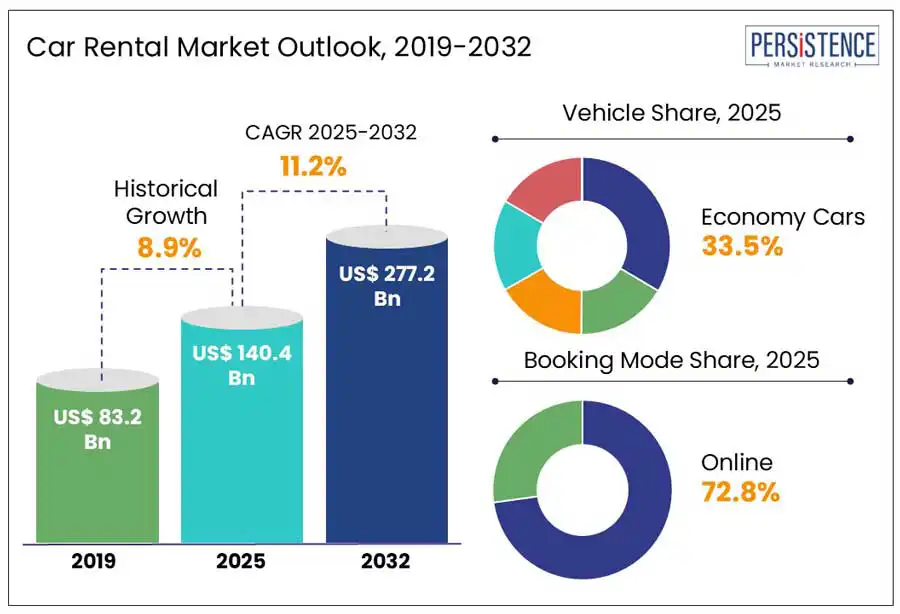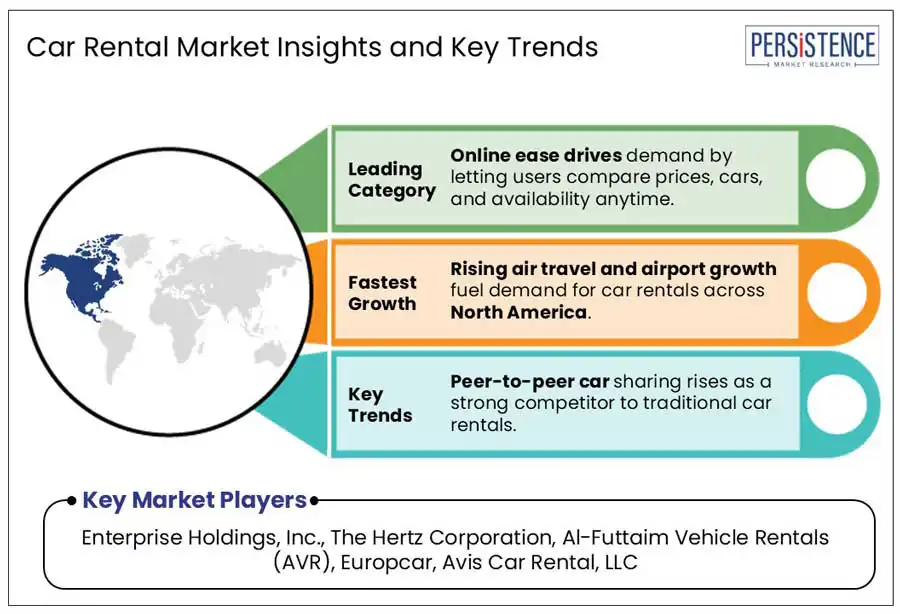Comprehensive Snapshot for Car Rental Market Including Regional and Country Analysis in Brief.
Industry: Automotive & Transportation
Published Date: April-2025
Format: PPT*, PDF, EXCEL
Delivery Timelines: Contact Sales
Number of Pages: 140
Report ID: PMRREP35245
The global car rental market size is projected to rise from US$ 140.4 Bn in 2025 to US$ 277.2 Bn by 2032. It is anticipated to witness a CAGR of 11.2% during the forecast period from 2025 to 2032.
A surge in global travel for both leisure and business purposes is estimated to propel the market as demand for flexible and convenient transportation options rises. Car rental operators are poised to improve their services with better corporate and customer data management to allow for highly efficient fleet operations and personalized offerings. Leading operators are also likely to leverage integrated global systems for managing their international operations.

Key Industry Highlights
|
Global Market Attribute |
Key Insights |
|
Car Rental Market Size (2025E) |
US$ 140.4 Bn |
|
Market Value Forecast (2032F) |
US$ 277.2 Bn |
|
Projected Growth (CAGR 2025 to 2032) |
11.2% |
|
Historical Market Growth (CAGR 2019 to 2024) |
8.9% |
Increasing business travel across the globe is a leading factor propelling the market. Demand for professional and reliable transport solutions is estimated to surge with the rapid expansion of domestic businesses into Tier II and Tier III cities as well as increasing cross-border partnerships. In countries such as Indonesia, Brazil, and India, the market will likely rise steadily. This is owing to the ongoing development of IT and consulting businesses requiring frequent employee commuting options, client site visits, and airport transfers.
Multinational corporations globally are mainly choosing subscription models and long-term rental contracts over acquiring in-house vehicle fleets. This shift is spurred by improved operational flexibility, reduced liability, and cost optimization. Small and medium-sized companies find rental services more cost-effective than vehicle ownership, specifically in areas with poor public transportation networks. In Indonesia, for example, the government’s Making Indonesia 4.0 initiative has resulted in a rise in intercity business travel, pushing dependence on corporate rental platforms such as Movic and TRAC Astra Rent a Car. As per TRAC, B2B rentals from mid-sized companies surged by 15% in 2023 alone.
In urban areas, the proliferation of car-sharing platforms and ride-hailing services is expected to hamper demand for traditional rental services to a certain extent. Modern customers are increasingly seeking on-demand mobility without the responsibility of managing a rental, mainly for intra-city or short-term travel.
In cities such as Berlin and London, car-sharing services, including Share Now and Free2Move, have gained momentum. The German Federal Environment Agency found that more than 10% of all motorized journeys in Berlin are based on car sharing. This ongoing shift is specifically prevalent among Gen Z and millennial customers who emphasize app-based convenience and flexibility over rental procedures.
A key opportunity for car rental service providers lies in adopting Electric Vehicle (EV) fleets. Increasing environmental consciousness among individuals is projected to create a high demand for sustainable alternatives to conventional vehicles. Several providers are anticipated to embrace EV in rental fleets to comply with sustainability goals. Hertz, for instance, recently declared its plans to make 25% of its fleet electric by 2025. It has already ordered more than 65,000 Polestar EVs and 100,000 Tesla vehicles to achieve this goal.
Similar initiatives by leading companies are likely to help raise consumer awareness about EVs and lower operational emissions. Western Europe and North America are speculated to lead in terms of EV fleet adoption, with government support in the form of incentives and tax rebates. As per a new report, around 42% of urban car rental customers mainly request hybrids or EVs during bookings in Europe. Norway has one of the most prominent EV penetrations worldwide and these vehicles account for more than 80% of the rental car segment. It is attributed to favorable policies such as tax exemptions and zero-emission mandates.
The booming tourism industry is expected to augment demand for car rental services globally. Both international and domestic tourists are now preferring independent and customized travel experiences over conventional public transport or guided tours. Rental vehicles provide high flexibility, specifically for accommodating group or family travel, managing tight itineraries, and exploring offbeat spots.
In 2023 alone, international tourist visits surpassed 1.3 Bn, recovering to over 88% of pre-pandemic levels, as per the UN World Tourism Organization (UNWTO). Regions such as Southeast Asia and Southern Europe are estimated to see high demand for car rentals in the forecast period as road-based travel plays a key role in tourism infrastructure. High popularity of eco-tourism and adventure tourism is further likely to positively influence rental preferences. Vehicles such as campervans and SUVs are projected to witness surging demand, primarily for coastal drives, wildlife safaris, and national park visits.
Based on vehicle, the market is divided into luxury cars, executive cars, economy cars, SUVs, and MUVs. Out of these, economy cars are envisioned to generate a share of nearly 33.5% in 2025, finds Persistence Market Research. It is attributed to their easy availability, high cost-effectiveness, and rising demand from budget-conscious customers. These are considered ideal vehicles for individuals demanding reliable and basic transportation solutions for vacations or short trips. Rental companies are hence focusing on extending their economy car fleets to meet the high demand.
SUVs, on the other hand, are projected to showcase steady growth in the foreseeable future. SUVs provide more cargo capacity and spacious interiors compared to conventional sedans. These properties are anticipated to make them a well-suited option for travelers with large groups and more luggage. Additionally, these vehicles offer a sense of stability and safety, which is appealing to individuals demanding comfortable and reliable travel solutions.
In terms of booking mode, the market is bifurcated into offline/direct and online. Among these, the online mode is poised to account for around 72.8% of the car rental market share in 2025. Increasing preference for digital platforms providing competitive pricing, transparency, and convenience is estimated to propel the segment. Millennial and Gen Z customers are constantly using online channels such as third-party platforms, apps, and official company websites to read reviews, compare costs, and make bookings as per their convenience. The surge of user-friendly and mobile-first apps is also anticipated to make booking processes smooth.
The offline/direct segment is envisioned to exhibit an average CAGR from 2025 to 2032. Offline channels are specifically preferred by those seeking reliable transportation options in areas with less internet penetration or those demanding personalized services. Geriatric populations are expected to be the target customers for offline rental service providers as these groups tend to be not so familiar with digital platforms. Rental counters across various airports and railway stations where travelers can directly book a car are further creating lucrative avenues.

North America is speculated to hold a share of about 37.4% in 2025. The U.S. car rental market is estimated to remain at the forefront of growth through 2032 in this region. The surge of peer-to-peer (P2P) rental platforms such as Getaround and Turo is expected to transform the field of car rentals in the country. These platforms enable individuals to rent out their personal vehicles, delivering diverse vehicle options and competitive pricing, including EVs and luxury cars.
Turo, for instance, established itself as a strong player in the urban and millennial-driven segment by operating in more than 5,500 U.S. cities and reporting over 3 Mn active users, as of 2023. Such P2P models are likely to lower the requirement for centralized fleet management and help attract budget-conscious customers across the U.S.
Asia Pacific is predicted to witness significant growth in the forecast period due to the rapid proliferation of app-based rental services in developing countries. In India, Revv and Zoomcar have already gained traction among the middle-class population due to their cost-effectiveness. Even though economy car rentals lead the domestic market, luxury cars are likely to showcase steady demand, specifically among international tourists and business travelers.
In China, the market is characterized by an increasing preference for long-term rentals that cater to both families and corporate clients demanding reliable mobility solutions. Booming domestic tourism and a shift toward EV fleets are anticipated to play key roles in boosting growth across Japan. Australia is also poised to see an increasing adoption of hybrid and electric vehicles among rental service providers to meet sustainability goals.
Europe is expected to experience considerable growth, with Germany and France at the forefront. Germany is expected to benefit from a surge in tourism. Visitors are constantly demanding to explore scenic regions such as the Black Forest and the Bavarian Alps. Mobile applications and digital platforms are hence assessed to be transforming the rental experience, providing novel fleet management systems and hassle-free booking.
As demand for sustainable transportation solutions skyrockets in France, car rental service providers are striving to adopt EVs in their fleets. The country’s government is also supporting this trend by offering financial assistance. A key initiative from the recent past was the government’s €100-a-month electric car leasing scheme. It was stopped after six months of initiation on the back of exponential demand. The government recorded nearly 90,000 applications for 25,000 available vehicles. The program is estimated to relaunch in 2025 to meet the unmet requirements of local companies.
The car rental market is highly competitive with the presence of several large-scale as well as mid-sized companies. Key companies are focusing on extending their geographic presence by setting up offices in untapped areas. They are also striving to create brand awareness by improving their existing services. A few leading companies are joining hands with local travel agencies to offer cost-effective yet efficient rental services.
|
Report Attribute |
Details |
|
Historical Data/Actuals |
2019 - 2024 |
|
Forecast Period |
2025 - 2032 |
|
Market Analysis Units |
Value: US$ Bn/Mn, Volume: As Applicable |
|
Geographical Coverage |
|
|
Segmental Coverage |
|
|
Competitive Analysis |
|
|
Report Highlights |
|
|
Customization and Pricing |
Available upon request |
By Vehicle
By Application
By Booking Mode
By Region
To know more about delivery timeline for this report Contact Sales

The global market is projected to be valued at US$ 140.4 Bn in 2025.
Boom in business travel and rising tourism industry are the key market drivers.
The market is poised to witness a CAGR of 11.2% from 2025 to 2032.
Rapid shift toward EVs to meet sustainability goals and the development of user-friendly online booking apps are the key market opportunities.
Enterprise Holdings, The Hertz Corporation, and Al-Futtaim Vehicle Rentals (AVR) are a few key market players.